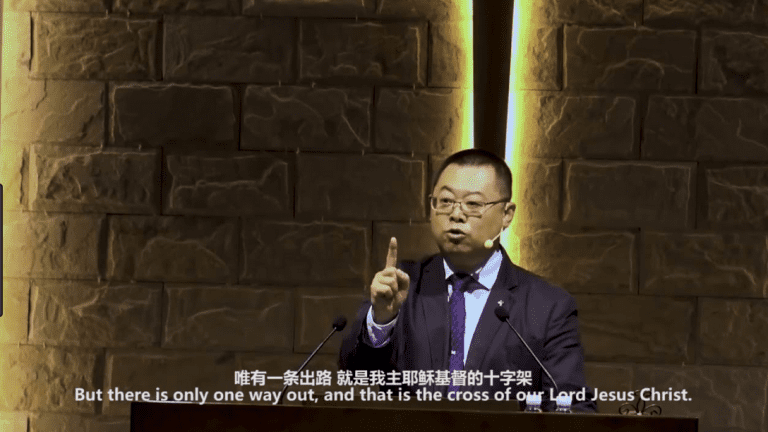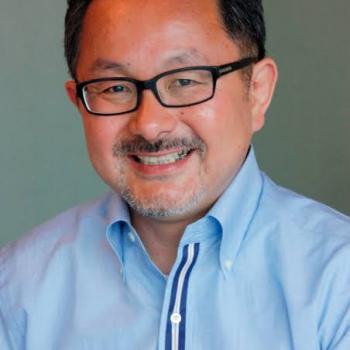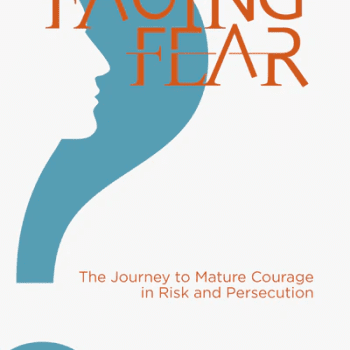As some of you may have heard, around a 100 congregants in Chengdu China came up missing a few nights ago after police detained them. Among those taken away was Pastor Wang Yi, who in 2004 was named “50 Most Influential Public Intellectuals of China” by Southern People Weekly. He is not an obscure backwoods pastor
Wang Yi met with President George W. Bush at the White House in 2006, with other Chinese human rights attorneys, to discuss religious freedom in China. He returned to Washington, D.C. in 2008, to attend the Conference for Global Christians in Law and was awarded “Prize for the Contribution to Promoting Religious Freedom.
Pastor Wang knew this day was coming. He wrote a letter to be released in case he was ever detained for more than 48 hours.
While we have received on-the-ground-updates, I am certain that communication with those involved will become more difficult. To ensure we all discern accurate information from mere “spin” (whether from the government, mainstream news, or over-excited Christian groups, it is important to pay attention to Wang’s own words.
In this and the next post, I will include the English translation of Wang’s letter with running commentary. I’ll attempt to highlight noteworthy ideas as well as any biblical and cultural undercurrents that could easily go unnoticed.
Due to length, I’ll divide his letter into two parts. The following is part 1 and includes my comments.

Open Letter from Pastor Wang Yi
On the basis of the teachings of the Bible and the mission of the gospel, I respect the authorities God has established in China. For God deposes kings and raises up kings. This is why I submit to the historical and institutional arrangements of God in China.
This bold declaration of God’s sovereignty is typical of evangelical pastors. Like Paul in Romans 13, Wang expresses his willingness to submit because he honors God supreme authority. This puts the governing authorities in a quandary, for Wang acknowledges the government’s authority but not on the same basis as the government would wish
As a pastor of a Christian church, I have my own understanding and views, based on the Bible, about what righteous order and good government is. At the same time, I am filled with anger and disgust at the persecution of the church by this Communist regime, at the wickedness of their depriving people of the freedoms of religion and of conscience. But changing social and political institutions is not the mission I have been called to, and it is not the goal for which God has given his people the gospel.
Like many Chinese pastors, Wang does not want to confuse the gospel and a narrow version of socio-political activity. The mission of the church does not primarily concern political systems, yet he soberly recognizes the inevitability of conflict between the church and governing authorities. This tension is not the desire of the church; rather, it is the choice of the government (as Wang will explain below).
For all hideous realities, unrighteous politics, and arbitrary laws manifest the cross of Jesus Christ, the only means by which every Chinese person must be saved. They also manifest the fact that true hope and a perfect society will never be found in the transformation of any earthly institution or culture but only in our sins being freely forgiven by Christ and in the hope of eternal life.
In this and the previous paragraph, Wang goes further than any pastor I’ve heard regarding the nature of the Communist regime and its prerogatives. Most Chinese are too apprehensive about provoking the government, yet Wang’s tone is unusually candid and direct by Chinese standards.
As a pastor, my firm belief in the gospel, my teaching, and my rebuking of all evil proceeds from Christ’s command in the gospel and from the unfathomable love of that glorious King. Every man’s life is extremely short, and God fervently commands the church to lead and call any man to repentance who is willing to repent. Christ is eager and willing to forgive all who turn from their sins. This is the goal of all the efforts of the church in China—to testify to the world about our Christ, to testify to the Middle Kingdom about the Kingdom of Heaven, to testify to earthly, momentary lives about heavenly, eternal life. This is also the pastoral calling that I have received.
I appreciate three aspects of this paragraph. First, he explains that Christian civil disobedience is an expression of love.
Second, his statement repeatedly refers to the brevity of life. Chinese people are incredibly sensitive to the topic of death. In fact, people do not want phone numbers that include the number 4 because “4” in Chinese sounds like the word for death. Wang evangelizes all Chinese people who will read his message.
Third, his wording reminds everyone that everyone in the present conflict must choose to which kingdom they will give their allegiance.
For this reason, I accept and respect the fact that this Communist regime has been allowed by God to rule temporarily. As the Lord’s servant John Calvin said, wicked rulers are the judgment of God on a wicked people, the goal being to urge God’s people to repent and turn again toward Him. For this reason, I am joyfully willing to submit myself to their enforcement of the law as though submitting to the discipline and training of the Lord.
Wang repeats an earlier point (about God allowing Communist rule) yet adds a caveat, a theme from the previous paragraph–– “temporarily.” The temporary nature of world regimes de facto is a call to repentance and simultaneously the reason Wang can “joyfully” endure persecution as discipline.
Compare Hebrew 12 and James 1.
At the same time, I believe that this Communist regime’s persecution against the church is a greatly wicked, unlawful action. As a pastor of a Christian church, I must denounce this wickedness openly and severely. The calling that I have received requires me to use non-violent methods to disobey those human laws that disobey the Bible and God. My Savior Christ also requires me to joyfully bear all costs for disobeying wicked laws.
He does not solicit support of others by appealing to others’ sympathy for him personally. While condemning the government’s actions, he presents his response (and implicitly a Christian response) as something to be expected (even “normal”) and thus a reason for joy.
But this does not mean that my personal disobedience and the disobedience of the church is in any sense “fighting for rights” or political activism in the form of civil disobedience, because I do not have the intention of changing any institutions or laws of China. As a pastor, the only thing I care about is the disruption of man’s sinful nature by this faithful disobedience and the testimony it bears for the cross of Christ.
How refreshing that he does not frame these events in terms of civil rights. Nor is he unclear about his primary agenda. While challenging the legitimacy of the government’s policies, he does not regard political reform as a substitute for the restoration that comes through Christ.
As a pastor, my disobedience is one part of the gospel commission. Christ’s great commission requires of us great disobedience. The goal of disobedience is not to change the world but to testify about another world.
Wang is under no illusion that the Great Commission (Matt 28) concerns a message about one’s private relationship with God. Because all authority belongs to Christ, being a disciple is a call to give Him ultimate allegiance. Such loyalty necessarily conflicts with any rulers who presume to demand the supreme allegiance of their people.
For the mission of the church is only to be the church and not to become a part of any secular institution. From a negative perspective, the church must separate itself from the world and keep itself from being institutionalized by the world. From a positive perspective, all acts of the church are attempts to prove to the world the real existence of another world. The Bible teaches us that, in all matters relating to the gospel and human conscience, we must obey God and not men. For this reason, spiritual disobedience and bodily suffering are both ways we testify to another eternal world and to another glorious King.
This pastor gets the gospel and the mission it entails. The poignant line for me is his comment that civil disobedience, thus challenging the public conscience, is an attempt to “prove to the world the real existence of another world.”
This is why I am not interested in changing any political or legal institutions in China. I’m not even interested in the question of when the Communist regime’s policies persecuting the church will change. Regardless of which regime I live under now or in the future, as long as the secular government continues to persecute the church, violating human consciences that belong to God alone, I will continue my faithful disobedience. For the entire commission God has given me is to let more Chinese people know through my actions that the hope of humanity and society is only in the redemption of Christ, in the supernatural, gracious sovereignty of God.
In Chinese culture, people typically think honoring an authority entails absolute obedience and, of course, never making the authority lose face. This is why his phrase “faithful disobedience” stands out. His counter-conventional perspective is a desperately needed message for the church inside and outside of China.
If God decides to use the persecution of this Communist regime against the church to help more Chinese people to despair of their futures, to lead them through a wilderness of spiritual disillusionment and through this to make them know Jesus, if through this he continues disciplining and building up his church, then I am joyfully willing to submit to God’s plans, for his plans are always benevolent and good.
Pastor Wang casts a prophetic vision that echoes Scripture. God’s people were oppressed in Egypt and then became sojourners in the desert. Centuries later, Israel was exiled due to idolatry and stubborn hearts. They needed a “second exodus.” So here, Wang calls fellow Chinese to follow the Lord, who will deliver them from a “wilderness of spiritual disillusionment.”
He models for us how we are to frame the story that marks our world. We, in our own ways, reenact parts of the biblical narrative. Our stories are subsumed within His grand Story. We are called to find our role in this drama at this moment.
Previously, I have discussed the Chinese Church in relation to politics:
I will include the second half of Wang’s letter with comments in the next post.












